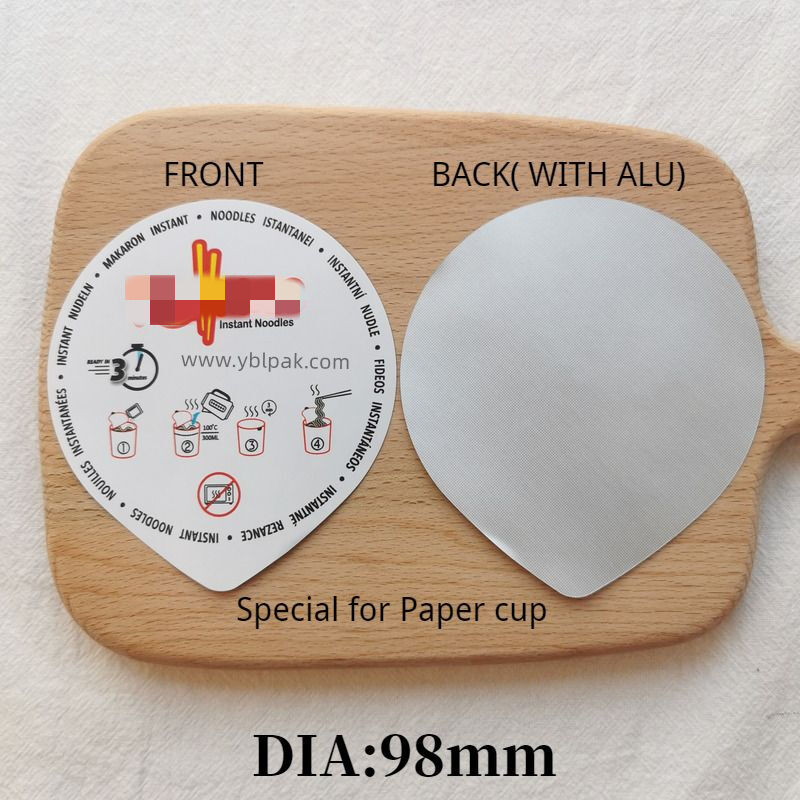Compostable Paper Lids for Instant Noodles Supporting the Environment
The Shift Towards Sustainability in Packaging
Traditional packaging has some serious environmental problems, especially when it comes to all the plastic waste we're creating. The World Economic Forum reports something crazy - around 100 million tons of plastic waste gets dumped every year. That's just mind boggling really. All this trash ends up everywhere from city streets to remote beaches, and it doesn't stop there. Plastic debris finds its way into oceans where it chokes marine life and breaks down into microplastics that enter the food chain. We've got real issues here with how we package things. If we want to fix this mess, we need to completely rethink our approach to packaging materials and disposal methods.
People are starting to care more about what happens to our planet, so they want their stuff wrapped in something that won't just end up in a landfill. The market for green packaging is growing fast right now because folks know better than ever before and governments are changing rules too. Some studies show this green packaging business might grow around 20 percent over the next few years. More shoppers today check if a company actually cares about nature before buying products from them. And let's face it, companies can't ignore this trend anymore since many countries are putting new laws in place that force them to find ways to package things without harming the environment so much.
Compostable Paper Lids for Instant Noodles
Paper covers lined with aluminum (ALU) are changing how we think about packaging because they combine what works with what's good for the planet. The mix of these materials gives instant noodle packages the strength they need against moisture damage while still supporting green efforts across the board. Many of these paper lids actually qualify under compostability standards like ASTM D6400. When thrown into proper industrial composting systems, they break down properly and go back into nature rather than sitting around forever. The ALU lining adds extra toughness to these lids so they stay intact during transport and storage. At the same time, manufacturers claim these products maintain their eco credentials even though they offer better performance compared to traditional alternatives on store shelves today.
Paper lids that can be composted bring some real advantages worth mentioning. The biggest plus? They cut down on landfill trash because they actually break down over time. These lids decompose pretty well in those industrial compost facilities, which means they leave behind far less environmental damage than regular plastic lids do. People seem to be catching on too. Recent surveys show most folks prefer going green when it comes to packaging these days. More shoppers are starting to care about sustainability and actively seek out products that don't harm the planet so much in everyday use. We're seeing this change play out in stores across the country where customers regularly pick compostable options over traditional ones, pointing toward what looks like a lasting movement toward greener packaging choices.

For more information, check out the Paper cover with ALU (paper lid) product page.
Advantages of Compostable Packaging Solutions
Compostable packaging cuts down on environmental impact because it breaks down into actual organic material that actually helps improve soil quality. Traditional plastics just hang around forever in our environment, sometimes taking centuries to decompose. But compostable alternatives, especially ones with plant based coatings, will break down properly when placed in industrial compost facilities, which means less stuff ending up in landfills. Some studies suggest these compostable packages might cut greenhouse gases by as much as 60 percent versus regular plastic though I should check if those numbers still hold true today. For businesses trying to green their operations and individuals wanting to do their part for planet earth, switching to compostable materials seems like a smart move forward.
Compostable materials actually do more than just help the environment they also bring real health advantages when it comes to keeping food safe. Regular plastic packaging has been known to let harmful chemicals seep into food over time, especially when exposed to heat or certain conditions during shipping. The good news is that compostable alternatives built from plant based materials and biodegradable polymers cut down on this problem quite a bit. Research conducted by major food safety watchdogs shows people who use these eco friendly containers get exposed to far fewer toxic substances compared to traditional plastics. With so many companies now focusing heavily on what's best for customers' wellbeing, switching to compostable packaging makes sense both for protecting public health and reducing environmental impact at the same time.
Innovations in Food Packaging
The food packaging world is changing fast thanks to new eco-friendly tech like biodegradable stuff and clever packaging that actually keeps food fresh longer. Businesses are really getting serious about cutting down waste while making sure what we eat stays safe. They're creating materials that just disappear after use or adjust based on how fresh the product inside remains. We're seeing things like compostable films and packages that can tell when something starts going bad. These changes point toward some exciting developments ahead for the industry. Beyond helping the planet, these improvements save money too since less food gets thrown away and storage costs drop over time.
A number of businesses are leading the charge when it comes to better food packaging solutions. Take Unilever for instance they want all their plastic packaging to be either reusable, recyclable or compostable by 2025. That shows real commitment to taking care of our planet. Coca Cola isn't far behind either. They rolled out something called the World Without Waste program where they promise to collect and recycle one bottle or can for every single one they sell by 2030. Both companies have seen noticeable improvements in what people think about their brands plus customers tend to stick around longer. What these big names in business are doing proves that going green doesn't just help the environment but also makes good financial sense in the long run.
Legislations and Consumer Awareness
Laws targeting single use plastics are popping up all over the world right now, changing what people buy and how markets work. France and the UK have gone pretty hard on plastic restrictions lately, trying to cut down on waste. We see similar moves happening in places like British Columbia and Hong Kong too. What's interesting is how these rules push businesses toward greener options. Companies want to stay compliant so they start looking at alternative materials that don't harm the environment as much. The numbers back this up too – sales of products labeled as eco friendly have shot up since these bans took effect. Looking at packaging trends specifically, we can clearly see legislation pushing sustainability forward as consumers gravitate towards items that leave less of a footprint when they shop.
Getting people to understand what makes compostable products so good is really important if we want to move away from regular plastic packaging. When brands talk up how much better biodegradable stuff is for the planet, folks start paying attention. Recent polls show most shoppers care quite a bit about green packaging options now, and plenty are ready to spend extra bucks on items that don't leave such a big mark on nature. Companies that make this connection clear in their messaging tend to see more interest from customers looking for greener alternatives. As more people become aware of these options, it creates real momentum for businesses trying to stay ahead of the curve in our increasingly eco-conscious world.
Conclusion: The Future of Compostable Packaging
When it comes to green initiatives, businesses have a major impact on sustainability simply by what they put their products in. Many companies are now switching to compostable packaging options made from plant-based materials instead of traditional plastics. This change helps cut down waste while meeting what customers want these days - people care about where their stuff comes from and how it affects the planet. For retailers especially, going green isn't just good for the environment anymore. Stores that make the switch often see better customer relationships too, as shoppers tend to stick with brands that share similar values when it comes to protecting our natural resources.
The buying public actually wields quite a bit of influence when it comes to pushing for greener packaging options. When folks back companies that care about sustainability, they're making a real difference for our planet. That means shoppers need to get educated on their options and start looking specifically for items that can be composted. The market responds to what people want after all. And if enough consumers push in this direction, we might see biodegradable packaging become standard practice instead of just something niche or specialty stores offer.

 EN
EN
 FR
FR
 JA
JA
 RU
RU
 ES
ES
 AR
AR
 BG
BG
 CS
CS
 DA
DA
 NL
NL
 FI
FI
 DE
DE
 EL
EL
 HI
HI
 IT
IT
 KO
KO
 NO
NO
 PL
PL
 PT
PT
 RO
RO
 SV
SV
 TL
TL
 ID
ID
 LT
LT
 SR
SR
 UK
UK
 VI
VI
 HU
HU
 TH
TH
 TR
TR
 FA
FA
 AF
AF
 MS
MS
 GA
GA
 EU
EU
 LA
LA
 NE
NE
 KK
KK
 UZ
UZ
